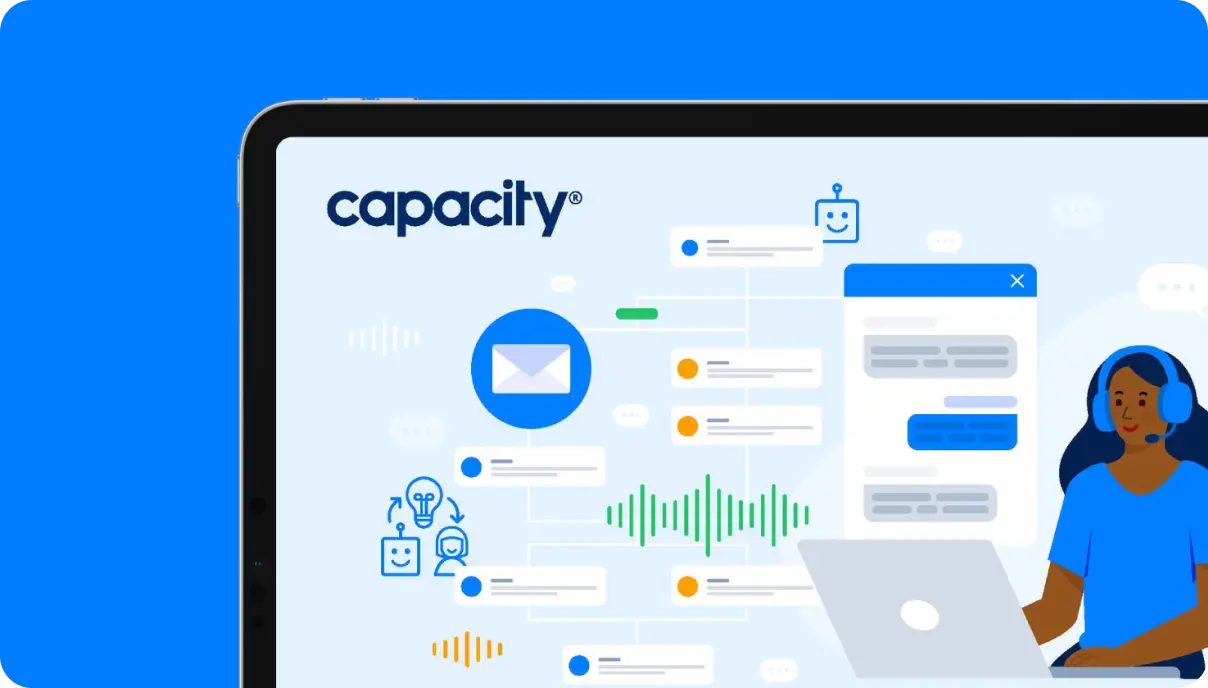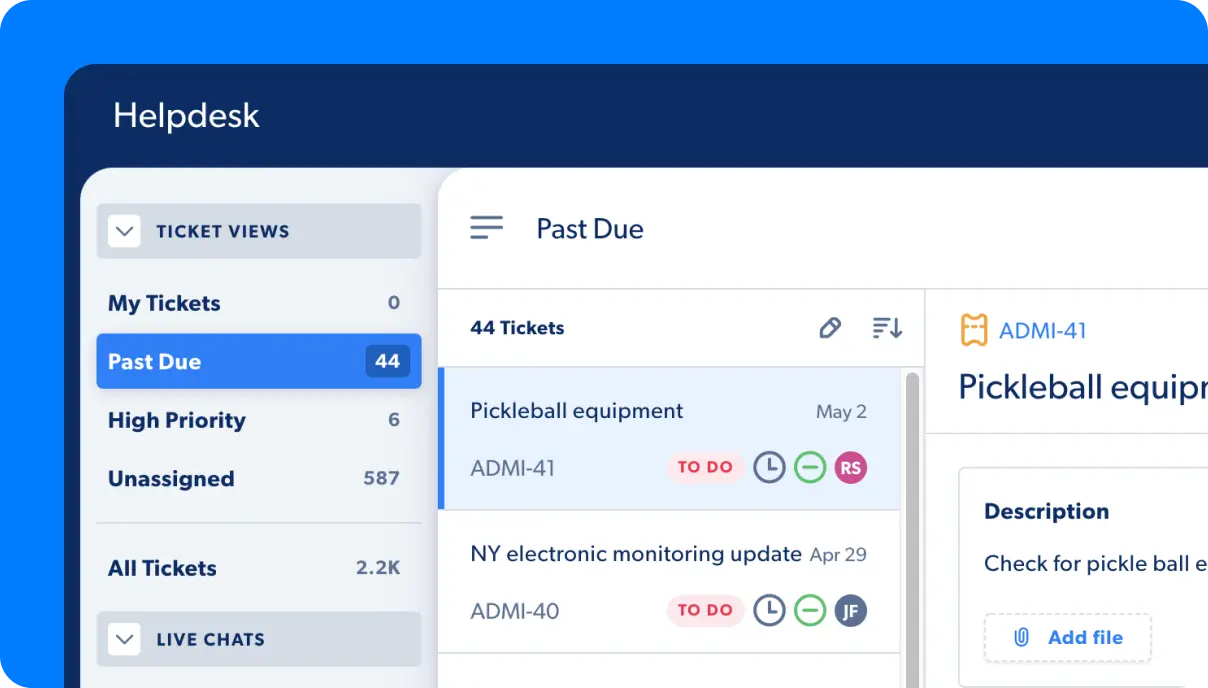Ah, chatbots. They’re the new superheroes of the technology world — equipped with superhuman abilities to make life easier for enterprises everywhere. Nowadays, enterprise AI chatbot solutions can take on various roles, from customer service agents to virtual receptionists.
Whether you embrace it or not – The future of enterprise technology is here. Artificial Intelligence (AI) chatbots are changing how companies connect with customers and automate their day-to-day operations. AI-powered chatbots can help simplify complex tasks like customer support, sales, marketing, and more – all without the need for additional staff or hardware. This complete guide to enterprise chatbots will give you a better understanding of how these AI-driven tools can help your business and achieve greater efficiency.

What is an enterprise chatbot?
Enterprise chatbots are designed to streamline tasks, answer inquiries, and optimize customer service for businesses. Using AI technology, these bots are programmed with answers to commonly asked questions by customers or team members and can take care of tier 0 and 1 queries swiftly and efficiently.
Chatbots use AI technology to surpass traditional bot expectations. Enterprise AI chatbots have become essential for how organizations interact with customers and employees. By leveraging AI technology, enterprise chatbots can provide more accurate responses to inquiries faster. The bots free up time for employees to focus on more strategic work. Ultimately, enterprise chatbots help businesses improve customer satisfaction and reduce operational costs.

What are the four types of enterprise chatbots?
Enterprise chatbots are AI-powered bots that streamline tasks, answer inquiries and optimize customer service for businesses. There are four main types of enterprise chatbots: FAQ, Conversational, RPA, and AI Customer Service Chatbots. Let’s take a deeper look into each:
1. FAQ Chatbot
These chatbots use natural language processing (NLP) to respond to customer inquiries with the correct answer from a selection of pre-programmed responses. This helps automate the first few tiers of customer service and provides customers with an efficient way to answer their questions quickly.
Common FAQs could include:
- Password resets
- General business questions
- Internal PTO requests
- Customer onboarding tasks
- Simple troubleshooting guides
2. Conversational Chatbot
These chatbots use AI to understand the customer’s words and provide a more natural conversational flow. This allows customers to have their inquiries answered quickly and in an engaging manner, just like talking to a human agent. AI chatbot technology has become so advanced that it can understand company acronyms, typos, and slang. Modern enterprise chatbots work with human agents to provide superior customer and employee support.
3. RPA Chatbot
Robotic process automation (RPA) is a powerful business process automation that leverages intelligent automation to carry out commands and processes. These robots can provide comprehensive support, from pulling information directly from a helpdesk ticket to agent-assisted tasks. RPA operates seamlessly in the background while drastically reducing time spent on everyday workflows.
4. AI Customer Service Chatbot
These chatbots are designed to provide customer service more quickly and efficiently than humans can. They use AI technology to understand customer inquiries and route them to the correct department or employee as needed. Additionally, AI customer service chatbots can identify and accurately interpret customers’ feelings and deliver accurate, instant answers.
How can chatbots help enterprises?
Chatbots have come a long way in the last few years. AI and automation technology can change how companies handle internal and external support (for the better). Here’s a look at two ways businesses can use enterprise chatbots for customers and team members:
Internal chatbots
Chatbots can provide numerous benefits to enterprise businesses. Firstly, they help free up time for employees by automating mundane and repetitive tasks, allowing them to focus on more complex tasks that require human thinking. Secondly, chatbots enable faster customer service interaction by quickly responding to inquiries. Finally, chatbots can help businesses reduce operational costs by promptly providing more accurate answers to customers. Enterprise chatbots are essential for business operations, enabling enterprises to keep up with rising customer expectations.
Here are some examples of internal tasks you can automate with enterprise chatbots:
- PTO requests
- Password resets
- Updating personal information
- Department goals and documents
- Lead generation
Customer service chatbots
Customer service chatbots can provide significant benefits to enterprise businesses. Firstly, these bots use AI technology to quickly and accurately understand customer inquiries and route them to the correct department or employee as needed. This ensures customers receive excellent support and immediate answers, ultimately increasing their satisfaction. Secondly, by leveraging AI technology, customer service chatbots can understand customer feelings and respond promptly. Finally, customer service chatbots are always available for customers to ask questions 24/7/365. Gone are the days when customers have to wait between 8 and 5 for a live chat agent to be available. In short, enterprise businesses should leverage enterprise chatbots to provide the best possible customer experience.
Here are some examples of customer support tasks you can automate with enterprise chatbots:
- Updating account information
- Common FAQs
- Basic troubleshooting problems
- Access to important documents
- Ticket updates

How to implement enterprise chatbots in 3 steps
Implementing chatbot technology in your org can be intimidating. Here are three steps you can follow to ensure success:
1. Analyze your business needs
Start by understanding the objectives of your enterprise and what type of chatbot will be best suited for it. Consider how you want to use the chatbot, such as customer service or internal operations automation.
2. Choose an enterprise chatbot platform
Once you have determined the best type of chatbot for your business, pick a platform with all the necessary tools and resources required to be successful. This includes integrating external systems, updated security protocols, modern AI technology, and more. We list a few of the best ones near the bottom of the page.
3. Train and launch the chatbot
After deciding on a platform, you can train it using a variety of scenarios that mirror real-life customer or employee interactions to ensure accuracy when deployed live. Finally, launch your chatbot on your chosen channels and start reaping the benefits!
By taking these three steps, enterprises can quickly and easily set up a chatbot that can provide outstanding customer service and operational support.

6 Enterprise chatbot platforms to watch
A variety of enterprise chatbot platforms are available to businesses, each with its own features and benefits. Here is an overview of six popular enterprise chatbot platforms:
1. Capacity
Capacity is an enterprise support automation platform for customer service and operations automation. The platform offers several features to help automate tedious tasks and workflows, including a helpdesk, knowledge base, and AI-powered technology. Pros include robust features and integration with popular enterprise solutions such as Salesforce, Slack, and Microsoft Teams. There are a few downsides, but users should expect to be trained on the platform to use the intricate system.
2. Converse AI
Converse AI is a chatbot platform that focuses on natural language understanding capabilities. It uses AI to analyze customer inquiries and provide responses in real-time. Pros include substantial natural language processing. Cons have limited customization options and need scalability when dealing with large customer bases.
3. Flow XO
Flow XO is an enterprise chatbot platform designed to help businesses automate operations tasks. It offers a variety of features, such as integration with popular CRMs, automated ticketing systems, and more. Pros include its user-friendly interface, analytics capabilities, and the ability to integrate with external applications. On the downside, some users have reported a lack of customization options and limited AI capabilities.
4. Intercom
Intercom is a chatbot platform that provides customer service and product support. It offers automated messages, live chat, and CRM integration features. Pros include a robust feature set and the ability to track customer engagement. On the downside, some users report difficulty setting up their chatbot when launching it.
5. Drift
Drift is an enterprise chatbot platform focused on customer service and marketing. It offers features such as automated conversations and natural language processing. Pros include support that can answer common questions from customers quickly. On the downside, setting up Drift’s conversational AI can be challenging for novice users.
6. Guru
Guru is a chatbot platform focused on knowledge sharing. It enables users to easily create and manage knowledge bases, which employees can access for quick reference. Pros include its ability to integrate with widespread applications. Cons include limited customization options and a lack of scalability when dealing with larger audiences. Additionally, some users have reported difficulty setting up the chatbot at times.
Businesses automate tedious tasks with Capacity
Did you know that companies who work with Capacity automate over 90% of time-consuming tasks and processes?
Businesses like AnnieMac Home Mortgage use Capacity to streamline customer support – improving satisfaction and retention.













































